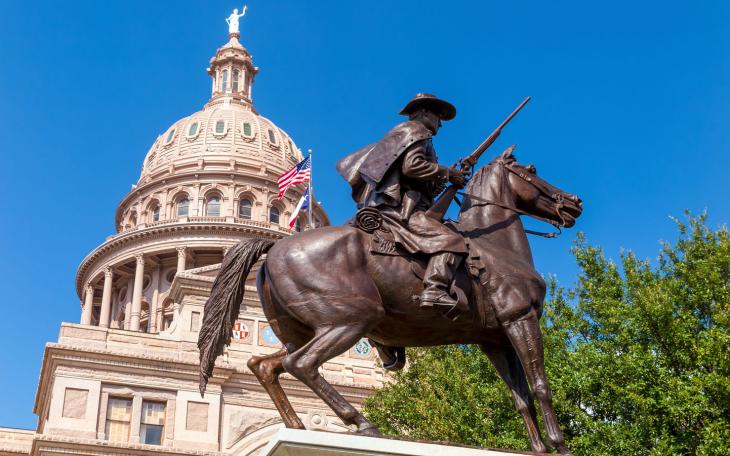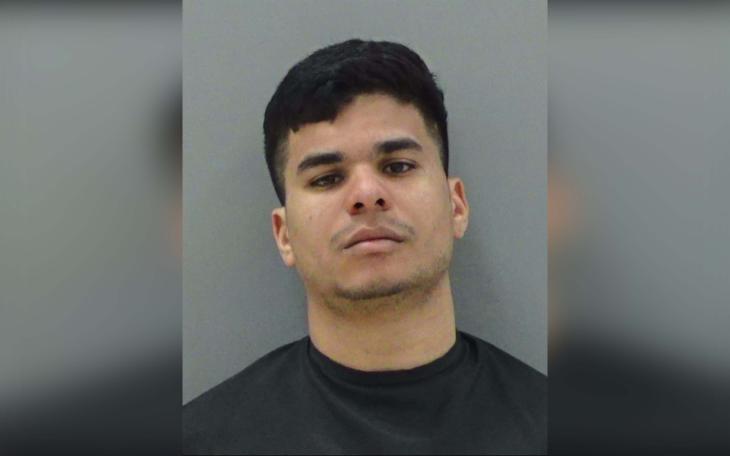EL PASO and DEL RIO, TX — It was the foreign nations of Mexico and in Central America's Golden Triangle that helped the Customs and Border Protection, or CBP, regain control of much of the border, not the U.S. Congress, said the acting head of the CBP.
CBP Acting Commissioner Mark Morgan and Deputy Commissioner Robert Perez were in El Paso Tuesday to release the FY 2019 enforcement statistics for their federal agency. Most of the activity was on the southwestern border between the U.S. and Mexico.
Repeatedly, Commissioner Morgan stressed that last fiscal year, 40 percent of Border Patrol Agents were taken off the front lines to deal with the humanitarian crisis caused by the influx of illegal alien family units and children. There were 473,000 family units and an additional 76,000 children apprehended at the border from October 1, 2018 through September 30, 2019, Morgan said.
They were among the 1,148,000 total apprehensions, 970,000 on the U.S.-Mexico border, Morgan said. In the month of May 2019 alone, CBP apprehended 144,000 individuals. On just one day in May, the count was 5,800 individuals. At one time, there were 20,000 individuals in custody vying for existing holding space for 4,000 people system-wide, Morgan said.
[[{"fid":"64152","view_mode":"default","fields":{"format":"default","field_file_image_alt_text[und][0][value]":"CBP Acting Commissioner Mark Morgan. (Contributed/CBP)","field_file_image_title_text[und][0][value]":"CBP Acting Commissioner Mark Morgan. (Contributed/CBP)"},"type":"media","field_deltas":{"1":{"format":"default","field_file_image_alt_text[und][0][value]":"CBP Acting Commissioner Mark Morgan. (Contributed/CBP)","field_file_image_title_text[und][0][value]":"CBP Acting Commissioner Mark Morgan. (Contributed/CBP)"}},"attributes":{"alt":"CBP Acting Commissioner Mark Morgan. (Contributed/CBP)","title":"CBP Acting Commissioner Mark Morgan. (Contributed/CBP)","class":"media-element file-default","data-delta":"1"}}]]
Above: CBP Acting Commissioner Mark Morgan. (Contributed/CBP)
Public knowledge of loopholes in U.S. immigration laws in Mexico and particularly in the Golden Triangle counties of El Salvador, Guatemala, and Honduras, along with unscrupulous coaching and mentoring by bad actors, such as the cartels, or what Morgan called "Transnational Criminal Organizations," or TCOs, encouraged victims to make the dangerous trek from their country, through Mexico, to flood the U.S.-Mexico border.
According to Morgan, time and time again, immigration officials begged the U.S. Congress to pass legislation to close the loopholes to no avail.
"But as they sat on their hands, the Trump administration developed amazing strategies and worked tirelessly to solve the problem," Morgan said.
"We essentially ended catch-and-release," he said. "[Traveling with a] kid is no longer an auto-passport into this country." The number or people attempting illegal entry using immigration loopholes that peaked in May have declined.
The Trump administration asked for cooperation from Mexico and Golden Triangle Countries to help stem the influx of people Morgan said were being victimized by the TCOs. The cooperation worked, he said.
In the Del Rio Sector of the CBP, Sector Chief Raul Ortiz said his Border Patrol Agents have a long, historical working relationship with Mexican law enforcement. It includes bi-national patrols, sharing intelligence, and repositioning resources to changing threats on the ground on both sides of the border.
What was different this time was that Mexico was willing to shelter in place, on the Mexico side of the border, asylum-seekers apprehended after crossing the U.S.-Mexico border into the U.S. By Mexico doing so, it relieved pressure on the shelters on the U.S. side of the border and effectively ended catch-and-release.
[[{"fid":"64153","view_mode":"default","fields":{"format":"default","field_file_image_alt_text[und][0][value]":"U.S. Border Patrol agents perform a water rescue and assist a migrant family in distress near Eagle Pass, Texas, August 20, 2019, (Contributed/CBP by Jaime Rodriguez Sr.)","field_file_image_title_text[und][0][value]":"U.S. Border Patrol agents perform a water rescue and assist a migrant family in distress near Eagle Pass, Texas, August 20, 2019, (Contributed/CBP by Jaime Rodriguez Sr.)"},"type":"media","field_deltas":{"2":{"format":"default","field_file_image_alt_text[und][0][value]":"U.S. Border Patrol agents perform a water rescue and assist a migrant family in distress near Eagle Pass, Texas, August 20, 2019, (Contributed/CBP by Jaime Rodriguez Sr.)","field_file_image_title_text[und][0][value]":"U.S. Border Patrol agents perform a water rescue and assist a migrant family in distress near Eagle Pass, Texas, August 20, 2019, (Contributed/CBP by Jaime Rodriguez Sr.)"}},"attributes":{"alt":"U.S. Border Patrol agents perform a water rescue and assist a migrant family in distress near Eagle Pass, Texas, August 20, 2019, (Contributed/CBP by Jaime Rodriguez Sr.)","title":"U.S. Border Patrol agents perform a water rescue and assist a migrant family in distress near Eagle Pass, Texas, August 20, 2019, (Contributed/CBP by Jaime Rodriguez Sr.)","class":"media-element file-default","data-delta":"2"}}]]
Above: U.S. Border Patrol agents perform a water rescue and assist a migrant family in distress near Eagle Pass, Texas, August 20, 2019, (Contributed/CBP by Jaime Rodriguez Sr.)
Instead of processing migrants claiming asylum and then releasing that migrant to travel deep into the U.S. to await a court date many months into the future, that asylum-seeker was transported back across the border to await their date in a shelter in Mexico. The program is called Migrant Protection Protocols, or MPP, that have come under fire from the Human Rights Watch, a non-profit U.S.-based advocacy organization that exposes human rights abuses.
"The inherently inhumane 'Remain in Mexico' program is getting more abusive by the day," said Ariana Sawyer, assistant US Program researcher at Human Rights Watch as quoted in a September 2019 article on the HRW website. "The program's rapid growth in recent months has put even more people and families in danger in Mexico while they await an increasingly unfair legal process in the US."
Yet, Ortiz said the MPP are working, effectively "managing the migrant population problem on the border. Some, they'll go back to their home country," he said, rather than wait it out for years in Mexican shelters for a U.S. administrative court date.
HRW argued migrants in the MPP face "high – if not insurmountable – barriers to due process on their asylum claims in the United States and threats and physical violence in Mexico."
Ortiz said the Del Rio Sector would soon benefit from a Mexican shelter being completed in Piedras Negras, across the Rio Grande from Eagle Pass.
One enforcement challenge the Del Rio Sector hasn't ever faced until FY 2019 was the large influx of migrants from African counties. "We've never experienced this before," he said. In all, there were 55,000 migrants nationwide processed through the MPP in FY 2019. "It took tremendous coordination with our Mexican counterparts," Ortiz said.
The crisis isn't over, and Morgan urged Congress to pass legislation to permanently close the loopholes in the immigration system. Ortiz agreed.
In April, Ortiz said as the sector chief, he didn't have operational control of the border. Today, six months later, Ortiz said he still doesn't. While the pressures of diverting manpower to sheltering apprehended migrants on the U.S. side have subsided, he said he remains undermanned. In the Del Rio Sector, there are 1,490 Border Patrol Agents. Ortiz said he needs 1,600 or more before he's comfortable. Ortiz said while the numbers have subsided from May 2019's record apprehensions, he expects to exceed FY 2019's number of apprehensions this year.
Curtailing illegal immigration is only part of the challenge. Crime, particularly the transportation of illegal drugs from Mexico into the U.S., greatly complicate the mission here.
In FY 2019, despite having 40 percent less manpower on patrol, the CBP still intercepted 750,000 pounds of illegal drugs. These were mostly hard drugs, including methamphetamine, heroin, Fentanyl, and cocaine. CBP also seized $75 million in illicit currency and 1700 weapons headed from Mexico into the U.S. and 1,000 weapons headed from the U.S. into Mexico.
There were 16,000 criminal aliens apprehended and 1,200 known gang members arrested. Gang arrests were up 20 percent over FY 2018. The criminals and drugs pouring across the border are impacting every community in America, Morgan said.
Ortiz said he hears from county sheriffs throughout his sector alarmed with the amount of drugs entering communities throughout the region. One drug that is gaining in popularity in these parts is methamphetamine. On top of the growing meth problem, the southwest border already leads the country in seizures of heroin.
"We are seeing a significant uptick in meth seizures," Ortiz said. And the drug cartels are getting smart about concealment. Ortiz called it "deep concealment" and bigger quantities of meth are being discovered in liquid form.
Meth is an expensive habit, and Ortiz said feeding that addiction makes U.S. citizens, particularly those hailing from urban areas, attractive recruits for the cartel smugglers who have used addicts to move product from the border in his sector to all points north. Ortiz riffed off Texas cities from where load car drivers his agents have apprehended are from. "Quite a few are from San Antonio, Houston, even suburbs like Katy," he said.
"There is a direct nexus of the load car drivers to alien smuggling. Oftentimes, load car drivers are operating a stolen vehicle. They don't know the area. They'll drive fast through ranchland crashing through fences, or be involved in motor vehicle crashes on these rural highways out here. It puts agents at risk. It especially puts our citizens at risk," he said. He said after apprehended, agents commonly discover meth pipes, the suspects have records of previous arrests for drugs, or they just admit they are hooked on meth and were recruited, Ortiz said. "All of this raises red flags."
Controlling the flow of drugs would be helped if there were more barriers on the border, like a wall, in urban areas like in Del Rio and Eagle Pass, Ortiz said. That will free up agents to patrol the remote rural areas where much of the drugs are being smuggled.
"A wall system, with the tech, the roads in urban locations offer strategic benefits for enforcement," Ortiz said. "Urban areas are where the kids and families are coming across. In remote areas, organized crime organizations are crossing the drugs." A wall would free up more agents otherwise working overtime in the cities to patrol those remote and rural hot spots where drugs are flowing into the U.S.
Back in El Paso, Morgan said the news media are spreading a lie about the wall not being constructed. He said he was standing in front of 76 miles of "new wall" that didn't exist until Trump became president. There is construction of an additional 450 miles of new wall planned to commence in FY 2020, he said. "It's not just a wall, it's a wall 'system,'" he said. A system includes sensors and roadways near the actual physical barrier.
"It's not a vanity wall. That's just a lie. Our experts have asked for the wall to have an enhanced ability to maintain operational control over our sectors," he said.
Despite the challenges, Ortiz claimed morale remains high with his agents. "We remain extremely focused and I see an uptick in morale, especially with their ability to get back on the front lines. They're doing a great job out there," Ortiz said.
Also on Tuesday, Ortiz administered the oath of office to 17 brand new Border Patrol Agents in the Del Rio Sector.
"Welcoming new employees is one of the pleasures of my position as Chief of Del Rio Sector,” said Ortiz, during his welcoming remarks. “This group brings a wealth of knowledge, diversity and experience to the Border Patrol and our community.”
Yesterday's ceremony ushered in one of the largest Border Patrol classes the Del Rio Sector has received in several years. They will attend the United States Border Patrol Academy in Artesia, New Mexico. The academy is a six-month long training program that will challenge them not only physically, but mentally as well.
Trainees will complete different courses including law, physical training, firearms, driving and Spanish.
Trainees that graduate from the academy will then report to their assigned stations and complete a 12-week field training program with guidance from a journeyman agents.
“We need more recruits,” Ortiz said. Low unemployment and scant availability of people seeking careers as Border Patrol Agents is the limitation, not money or resources from Washington, Ortiz said.
Subscribe to the LIVE! Daily
Required






Post a comment to this article here: